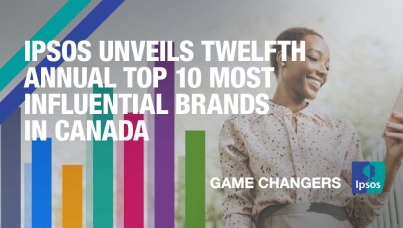Click and Connect: New Study Shows that the Internet Has Re-Defined The Social Interactions Of Canadians, By Helping Start New Relationships.
Vancouver, Oct. 2, 2000 - Interpersonal communications has been an integral part of the Internet since day one, but a new Ipsos-Reid study shows that a significant proportion of online Canadians are meeting new acquaintances, and establishing new personal relationships online. In many instances, this has led to meetings in person for friendship, but also for more intimate relationships.
Of the 70% of Canadians that currently have access to the Internet, 86% have used email, and a further 71% communicate via email once per week or more often. A further 32% have participated in chat sessions, and 12% do so on a regular basis (once-per-week). More significant is the fact that almost three-in-ten (28%) Internet users in Canada say they have met new friends online that they continue to communicate with on a regular basis. This high-tech social interaction is particularly relevant for Canadians 18 to 34 years of age, where 39% have met friends online, but older age groups are only slightly less likely to participate in the activity (about one quarter of 35 to 54 year olds and those 55 or older).
"Online Canadians appear to be a social lot," said Steve Mossop, a Senior Vice-president at the Ipsos-Reid Corporation. "This trend runs contrary to the common perception that the Internet is not a social medium. The Internet has provided a means to cultivate relationships that people may be lacking in their offline world."
The study also shows that 39% of online Canadians who have started a relationship with someone online have actually met them in person. Men (44% vs. 35% of women) and younger online Canadians (45% of those 18 to 34 versus 36% of those over 34) are most likely to have met an online friend in person.
However, it seems some online Canadians have been reluctant participants to this social interaction--as the proportion who have met an online friend in person (39%) is significantly lower than the proportion who have been asked to meet their online friend in person (58%).
Mossop noted: "It is clear from the research that anonymity is key. The majority of Canadians who have established an online relationship want to keep it online only. The gap between being asked to meet someone in person and actually going ahead and meeting this person indicates that a sizable portion of Canadians do not want their online relationships to move into the `real world'."
Among online Canadians who have gone ahead and met an online acquaintance in person, slightly more than half (56%) say that the reason for meeting was strictly for friendship purposes. Just over one-in-ten (13%) say the purpose of the meeting was for dating, while 28% say it was for both friendship and dating. There were even three instances in the survey where a person had met their spouse online.
For the most part, online Canadians are being honest about themselves when it comes to communicating with people they have never met before. Four-in-five (82%) respondents who met their online acquaintance in person say this person was similar to how they had described themselves. An equal proportion of all online Canadians (80%) say they have not lied about their age, gender, occupation, income, or physical characteristics while chatting online. Lying about personal characteristics is more prevalent among men than women (12% of men have lied versus 8% of women) and younger people (20% of 18 to 34 year-olds have lied, versus only 6% of those over 34).
"It seems that there is a misconception that everyone online lies about who they are," says Mr. Mossop. "However, based on our research, people who misrepresent themselves are only a minority. And even so, most of it is likely harmless exaggeration. It is when online lying turns into in-person meetings that result in uncomfortable or even dangerous situations that give the net a bad name."
Methodology
The "Canadian Inter@ctive Reid Report" is the largest, most comprehensive and authoritative source of its kind about quarterly Internet trends in Canada. The results are based on two separate data collection instruments. In the first, 1,084 web users from Ipsos-Reid's Canadian Internet Panel are surveyed online. Panelists are chosen through random telephone surveys conducted on an ongoing basis across Canada. Results are complemented by a further 1,500 interviews via telephone with Canadian adults in order to verify results of the panel, and track issues among non-Internet users. All interviewing was conducted during the last two weeks of June, 2000.
These data are statistically weighted to reflect the population proportions of regular online users by online expertise, and regional distribution, as well as demographics such as gender, age and income. Our panelists represent approximately 11.4 million Canadian adult Internet users who are online for one hour a week or more (there are a total of 15.3 million adults who have Internet access).
With a national sample of 1,000 and 1,500 (for each component), one can say with 95% certainty that the overall results are within a maximum of 177 3.1 percentage points of what they would have been had the entire population of Canada's regular online users been surveyed. The margin of error will be larger for sub-groupings of the survey population.
About Ipsos-Reid
Established in 1979, Ipsos-Reid is Canada's leading market research and public opinion company. Its is best known for the National Angus Reid Poll, the most widely quoted source of public opinion in the country. Founded by Dr. Angus Reid, Ipsos-Reid has conducted extensive market and social research in 80 countries and in 40 languages, and serves clients around the world through more than 300-professionals and 1,000 data collection staff in ten offices. The company is a member of the Paris-based Ipsos Group, ranked among the top ten research companies in the world, with specialties in advertising, media, customer satisfaction, public opinion and market research.
For more information on this news release, please contact:
Steve Mossop
Senior Vice President &
Managing Director
Ipsos-Reid
(604) 257-3200



